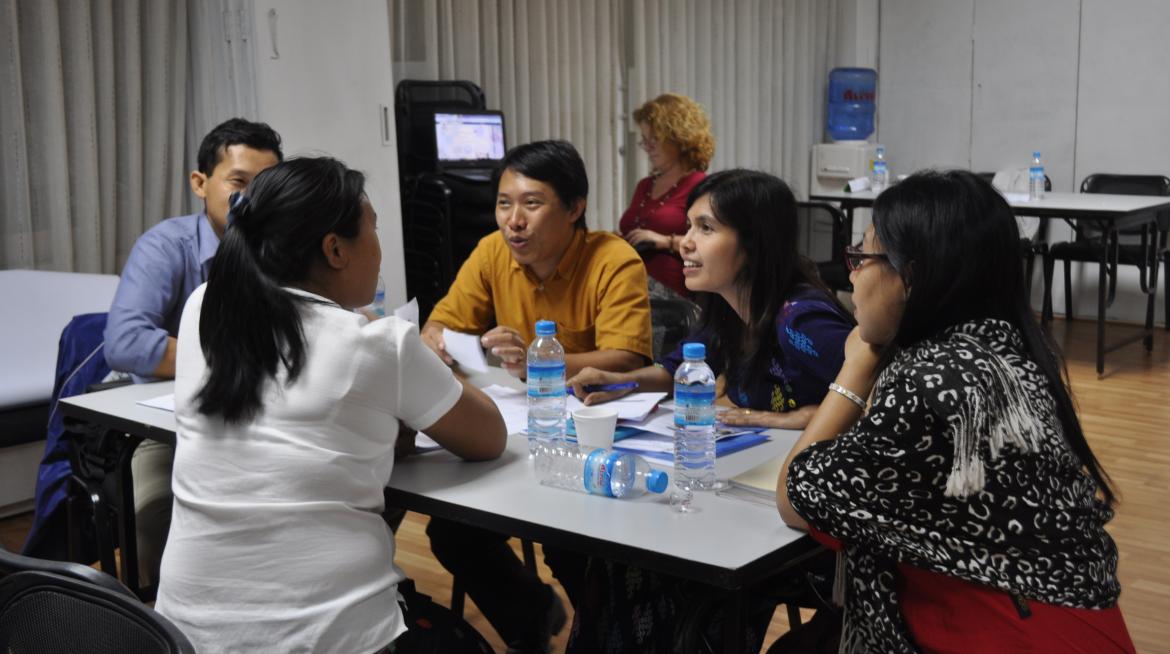
Leveraging Essential Nutrition Actions to Reduce Malnutrition (LEARN) held a day-long feedback workshop this month to review and validate the findings of the food taboo and dietary restrictions research, carried out by BBC Media Action. Conceived by LEARN and funded by LIFT, the qualitative research aims to better understand the role of food taboos and habits in the first 1,000 days from conception to a child’s second birthday. The formative research activities were conducted in partnership with LIFT implementing partners —World Vision, World Fish and Save the Children in the Delta and Dry Zone. The results of the research will equip LIFT partners to implement evidence-based social behavior change communication activities to improve the nutritional status and wellbeing of LIFT beneficiaries.
BBC Media Action are the international development arm of the BBC and a registered charity in the UK. In Myanmar, they have focused mainly on governance and resilience, having developed and produced youth radio programs, social inclusion radio dramas and public service announcements in collaboration withA MRTV.
There were three components to the formative research – literature review, key informant interviews and community research. The literature review assessed the availability of relevant research in Myanmar and the Asia region on food taboos and dietary restrictions. Key informant interviews were held with relevant experts working in the field of nutrition and health in Myanmar to provide insights into the research topic. Nutrition and research experts from UNICEF, Alive and Thrive, World Vision, ACF International, Hellen Keller International, and Catholic Relief Services reviewed the research tools.
BBC Media Action presented the details of the research design and methodology, including tools and analysis process as well as the research findings. The main findings included the accumulation of a list of foods which women from the Delta and Dry Zone would not eat themselves or feed their children in the first 1,000 days with thoughts it would result in a negative impact for one or both of them. The list of dietary practices gathered across the locations is available here. This then lead to an opportunity for partner discussion to validate findings, ask questions and provide feedback. LEARN hopes that these findings will contribute to strategic stakeholder social behavioural change communication efforts in the future.
During the validation workshop, BBC Media Action Senior Health Advisor, Sophia Wilkinson also discussed different models and formats for health communications in order to identify possible channels for behaviour change messaging for LIFT beneficiaries. Sophia brings 20 years of experience working in media and health communications, in Asia and Africa and was able to showcase BBC Media Actions nutrition and health approaches, outputs and programmes from other countries.
Ms. Wilkinson discussed the concept of ' engage and surround' and outlined the multiple delivery channels for disseminating health messages, including radio, TV, mobile phones, discussion groups, theater and interpersonal communication. Some examples of how BBC Media Action have done this can be found here. BBC Media Action works with country partners, which gives them better access to, and understanding of, the communities where they work. They also work with local producers to provide tools for community workers to help them communicate effectively.
The work that BBC Media Action is doing is successfully changing communities to have healthier behaviors, transformed social factors and improved health systems. “Effective health communication is because of research. It is the first step of planning as it provides insight into what can change. It is important to care about finding out if what you have done has worked and to learn from mistakes,” explained Sophia.
LIFT encourages increased public spending to make a reduction of stunting and it’s projects promote the importance of good nutrition. See more about LIFT’s work on nutrition here.
See more about BBC Media Action’s work in Myanmar here.


